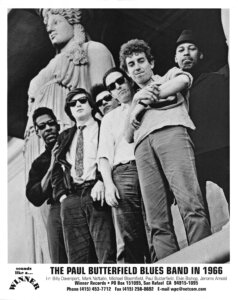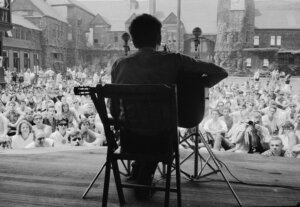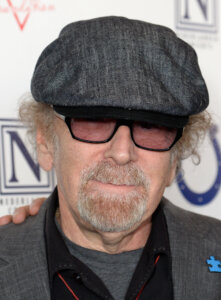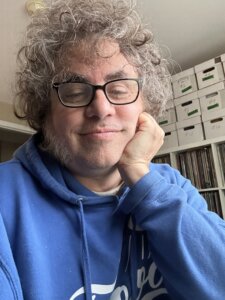I was up onstage with Bob Dylan at Newport the night he went electric
For keyboardist Barry Goldberg, the legendary 1965 folk festival started out as a nightmare but ended up as a dream
The 1965 Newport Folk Festival started out like a wonderful dream for me — and then it became a nightmare, and then it became a wonderful dream again.
We rolled into Newport Thursday, the first day of the festival. For a lot of the guys in the Butterfield Band, this was their first time away from Chicago. The festival was a major event for us, and Newport itself was just so beautiful. It was a gorgeous summer day, and everyone seemed to be singing, playing or just talking about music.
I quickly realized that I wasn’t exactly dressed for the occasion. I was wearing my tapered pants and pointed shoes — the whole “cool Chicago jazz guy dating Playboy bunnies” thing, totally wrong for Newport. Everybody else was walking around in jeans and sandals; at one point, I caught a glimpse of Joan Baez running through the fields, beautiful and barefoot.
Inappropriate clothing aside, I was so excited to be there. Little did I know that my world was about to crumble.
When I met up with the Butterfield Band to rehearse our set, Paul Rothschild — the Elektra Records A&R guy who was going to produce the band’s debut album — took one look at me and said to Paul Butterfield, “I don’t hear keyboards with the band. I don’t want him here.” And that was it. In one minute, I went from having the greatest time to being completely alone and having no gig. It just destroyed me.

I wanted to go home, but I couldn’t. If I’d had the money for a plane or train or even bus ticket out of there, I would have been gone in an instant. Instead, I had to wait around for a couple of days so I could drive back to Chicago with the Butterfield guys. I was stranded, which was horrifying because everybody else was grooving and having fun, and I was miserable because I’d been relieved of my duties. It was a real bummer.
I don’t remember much from the next day or so of the festival, probably because I was in such a daze over my sudden rejection. But Saturday night, I found myself at a party with Michael Bloomfield and Bob Dylan. Bob had done a short acoustic performance at the festival that afternoon, which was what everybody expected from him, but now he was talking to Michael about getting a band together for his festival-closing performance Sunday — something people were definitely not expecting.
“I don’t know if anyone’s going to show up to play with me tomorrow night,” I overheard him saying to Michael. “Al Kooper was supposed to come, but I don’t know for sure that he’ll be here, and I might need a band.” Michael called me over and introduced me to Bob. “Barry’s a great keyboard player,” he said. “Hey, why don’t you use the Butterfield Band to back you up?” “That’s a great idea,” Bob responded, and they went off together to discuss it.
To be honest, Bob’s earlier folk stuff hadn’t really been my kind of thing. I was not a peace-and-love, protest kind of guy. But “Like A Rolling Stone,” which had just come out a month earlier, seemed a little cooler to me. See, Bob was a rock and roller at heart, just like we were. Bob grew up listening to Gene Vincent and Little Richard and Buddy Holly and all those great rock and rollers, just like Michael and I did.
Michael and I had a territorial and maybe even sartorial connection with Bob, too. We were three Jewish guys from the Midwest who had similar backgrounds, similar attitudes, and even the same clothes — when I met Bob at the party, he was wearing tapered pants and pointed boots, just like I was. Bob could tell we were cool, that we were at Newport to play music and not just to “make the scene.” He knew we weren’t putting him on some kind of folk-protest pedestal, either; if he wanted to play electric music to a folk festival crowd, that was fine by us.
Michael and Bob came back over to where I was standing. “Would you like to play with me?” Bob asked. “Are you kidding?” I said. “Of course!” And that was it. Bob Dylan, on the spur of the moment, had decided to form a gang, and decided that Michael and I had what it took to be part of it. And as soon as he invited me to play with him, it was like Newport went back into “wonderful dream” mode for me.

We did our soundcheck the next afternoon, and I was in heaven. I knew that Bob was taking the next step toward something new in his life and music, and it felt magical to be part of it. At one point during the soundcheck, he started playing “This Land Is Your Land” on the organ, and I sat down next to him and fell right in with him on the instrument.
It seemed symbolic for him to be playing that Woody Guthrie song while all these musicians were up there onstage with him, plugging in their electric instruments and finding their sound levels. It felt like he was saying, “This is where I’m going now. I respect everything you gave me, but we’re going to do something really radical now.”
Michael was on guitar, of course, and we had Jerome Arnold and Sam Lay from Butterfield on bass and drums. Al Kooper showed up during soundcheck, which gave us both piano and organ — a combination that would be popularized by The Band, Procol Harum and others in the next few years, but was still pretty unusual for the time. We went through the songs Bob wanted to play: “Maggie’s Farm,” “Like A Rolling Stone” and “Phantom Engineer,” later retitled “It Takes a Lot to Laugh, It Takes a Train to Cry.”
It all sounded great, except Jerome wasn’t getting the changes on “Like A Rolling Stone”; he was a blues bass player, and that song was a little out of his comfort zone. “I can play bass for ‘Like A Rolling Stone,’” Al suggested. Jerome was cool with handing Al the bass for that song, and I took over from Al on the organ. It was all kind of spontaneous. Bob was wearing this great polka-dot shirt, and he just looked so cool and in control, even though we were all totally winging it.

In some ways, the soundcheck was just as intense as the set we’d play later that night. Peter Yarrow, who was on the festival board and was going to emcee the evening’s show, kept yelling at us to turn down. Every time Yarrow yelled at us, I could see Michael glaring back at him like, “Oh, just you wait, motherfucker. Just you wait.” He hated these pompous folk guys anyway, the pseudo-intellectual know-it-alls, and Yarrow was the epitome of all of that.
Albert Grossman, Bob’s manager, spent the whole soundcheck fighting with Alan Lomax. Lomax was famous for discovering and recording all these old folk and blues singers, and he hated the very idea of electric music being performed at a folk festival. Grossman was there to support his artist, and neither one of them was backing down. These two old hipster guys wound up rolling around on the ground, punching each other.
It was really bizarre. Yarrow was screaming at us, and Grossman and Lomax were down there fighting. I sensed that a battle line was being drawn, and we all were on a mission together. Bob was our leader, but the more uptight people were getting over what we were doing, the more I also saw that look in Michael’s eyes that said, “I’m just going to shove this down your throat.”
When we went onstage with Bob that night, I was terrified. I was used to playing blues clubs and bars and mafia joints, not festival stages in front of thousands of people.
The thing with me, though, is that I’ve always been terrified before going onstage. Playing the very first note after I get up there, that’s the hardest part; but by the time I get to the second note, it’s just automatic.
The magic was definitely there that night, for all of us, as soon as the lights went on and we saw Dylan coming out, all in black, with that Stratocaster strapped on. That was a statement in itself, but it was also so much more. You felt how important his presence was, and how important what he was doing was; you knew it had meaning.
I wasn’t even aware that there was that much of a negative reaction from the crowd, to be honest. I mean, I wasn’t deaf, but I heard the cheers mixing with the boos, and I knew that there were some people out there that dug what we were doing. The others weren’t even listening; they were in shock, reacting to the moment and their feeling of betrayal. They were so angry that Bob was turning his back on the folkies, they couldn’t get their heads around what he was doing. For years, Bob had done his folk thing, and now all of a sudden it signified the end of the folk era as they knew it. Bob’s performance was closing that particular chapter, but he was also opening up a new one by creating folk-rock — an accomplishment that was more important than the crowd’s reaction.
To me, the song that really came off well was “Like A Rolling Stone.” Kooper’s bass playing really made a difference on the bottom end, and Bob’s vocal performance was really, really cool. When we played “Maggie’s Farm,” Michael responded to the boos by turning his amp all the way up; he started really burning, blasting them in the name of rock and roll. I heard later that Pete Seeger tried to cut the power with an ax, because he was angry that Michael’s guitar was drowning out Bob’s vocals, but if you listen to the tapes of the show, Bob’s vocals are loud and clear. I knew Michael was playing a little too loud, but so be it. We were warriors on a mission to back up the leader of the gang.
By the time we finished our short set, the mixture of cheers and boos was even louder and more intense than it was when we started. Yarrow went up and told the crowd, “Bobby’s going to come back onstage and play a song on acoustic,” and Bob eventually got back out and played “Mr. Tambourine Man” and “It’s All Over Now, Baby Blue” by himself. But we didn’t hang around for any of that. We had done our thing, and now it was time to pack up and go. I walked offstage that night feeling like a hero, and I didn’t want anything to break that spell. I had done my thing with Bob, and that was more than I could have ever hoped for, to go from not being able to play at the festival to taking this momentous jump into the musical unknown. I knew that some kind of force, some kind of fate, some kind of thing had come along and touched me, and I wasn’t going to fuck with it.























